#orchestrated music
Explore tagged Tumblr posts
Text
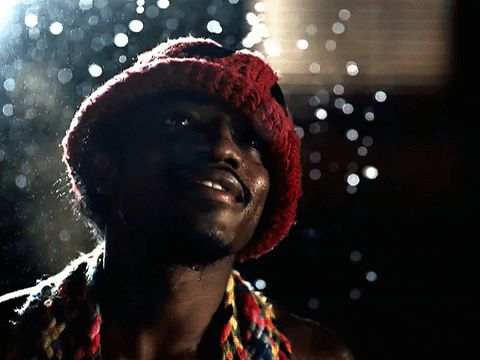
Outkast x Nu Deco Ensemble - SpottieOttieDopaliscious
#outkast#@outkast#aquemini#SpottieOttieDopaliscious#nu deco ensemble#@nudecoensemble#orchestra#orchestral music#90shiphop#hiphopheads#big boi#andre 3000#stankonia#ms jackson#outkast cover#blackisbeautiful#blackmusic#black culture#hiphop culture#for the culture#live music#live performance#hiphop50#blackisavibe#blacktumblr
1K notes
·
View notes
Text
The synthpop duo is the perfect dynamic to me. One is the goblin that presses buttons while the other sings a beautiful ballad about whatever they were both hyperfixating on that week
#synthpop#new wave#music#text#Orchestral Manoeuvres in the Dark#OMD#Soft Cell#Pet Shop Boys#Erasure band#Erasure#and many others#Sid posts
92 notes
·
View notes
Text

Keith Mansfield – Link Up (1989)
#album art#music#1980s#keith mansfield#library music#production music#kpm#orchestral#vaporwave#floppy disk
103 notes
·
View notes
Text
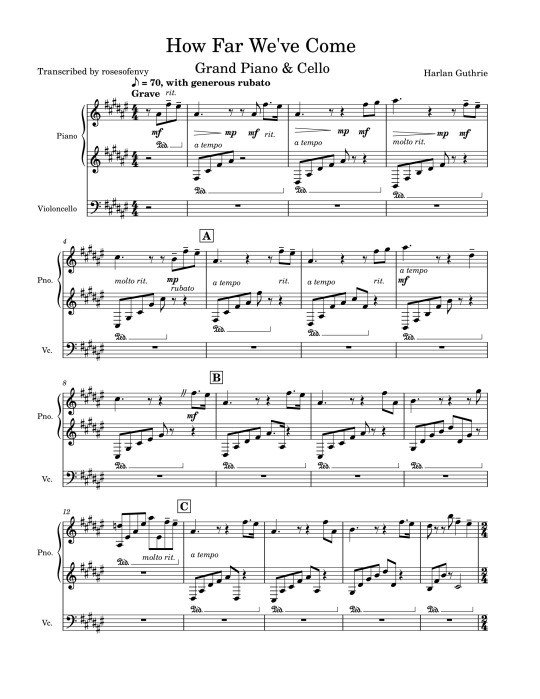

How Far We’ve Come - Music Theory Analysis
[Disclaimer: I went to university for music as a violin primary and have the most confidence with classical strings. I passed my piano proficiency courses, but that is the extent of my piano knowledge. It has been a few years since I have done an in-depth composition analysis of any piece, let alone transcribing a piece by ear and then analyzing it. Music theory has never been my strong suit! Please excuse any mistakes in notation, and any inaccuracies in my transcription or analysis. I did my best and this was purely for fun *shaky thumbs up*]
----------------------
'How Far We’ve Come' by Harlan Guthrie is a duet between Grand Piano and Cello. This piece opens with solo piano, either in a pickup measure or in a single measure of 2/4 before transitioning to 4/4 time in measure 2. Throughout its entirety there are many moments of rubato which have been notated as ritardando and a subsequent a tempo. To most accurately follow the phrasing, listening to the recording is highly recommended.
This piece begins in the key of F#M or the enharmonic spelling of GbM. Although unpleasant to look at with either 6 sharps or 6 flats, depending on which spelling is followed, this key is often used by composers to invoke emotions of a conquest story, evoking relief, triumph, victory, and clarity. As we know from our story in Malevolent so far, this meaning is not lost on us. I have chosen to keep this piece as F#M since that is how I originally began transcribing it. I have also attached the GbM version at the end of the post, however all the analysis follows F#M spelling.
The lone piano begins on the third of our I chord with a hesitant, heavily rubato 8th note pickup into measure 1. The transition from measure to measure in this first phrase gains little confidence, especially with the transition from the pickup into m. 1 as this is the only instance in the piece where the set of 8th notes in the left hand do not lend itself into the next right hand pickup (four 8th notes instead of five). Each lead-in to the downbeat is stretched, pedal held throughout the measure to allow the sound to linger. Each press of the keys is deliberate, yet maintains a mezzo dynamic as the sound fades. m.2 is introduced with a vi chord, creating a hint of unease before resolving in m.3 to a IV(add7). We end our first phrase with a half cadence to a V chord, leading into a V7 as our next phrase begins with a B.
As we enter our second phrase it is similar to our first with m.5 beginning with a I chord, m.6 expands our vi chord compared to its first iteration, resulting in a more confident feel as we continue into m.7 with yet another expansion to our IV(add7). M.8 ends this phrase as we reach another half cadence V chord almost V7.
Beginning m.9 the piece has a few possible paths of analysis, we arrive on a vi chord if we are remaining in F#M, which unlike our other initial starting phrases this throws us into a melancholic mood. There is a possibility of modulation to the relative minor (D#m), however I believe it remains in F#M and utilizes inversions of our chords and will continue with this assumption for the next phrase.
Remaining in F#M, m.10 could be a vi(4/2) inversion, or a I(6/4) inversion. Because Measure 11 moves to a ii chord, I believe it makes more harmonic sense for m.10 to be a vi(4/2) inversion as moving from a I(6/4) - ii is less common than a vi(6/4) to a ii.
M.11 into m.12 is a fascinating progression. We have a V with the (g) in m.11, then we are descending to a Dnat, A#, E# progression. The Dnat is what has thrown me off the most, as it is a minor chord of sorts but doesn’t exist within our key of F#M, or relative D#m. The E# A# progression I believe is a I(4/2) chord, as it is leading us back into the next phrase. Even spelling enharmonically as a A#, Cx, E# chord it does not naturally occur within our existing key. After many hours of checking theory textbooks, writing out possible modulations, and playthroughs of the chords, I’m choosing to leave this as a V-I(4/2) progression and accepting my loss that I do not know what chord exists in the downbeat of m.12. However, I can say that resolving to something that is not a root tonic further creates this sense of melancholy.
Bringing us to our next phrase at m.13, similar to our previous phrase a vi chord but instead of resolving to an A# it resolves to the root D#. M.14 is identical to m.10 with the exception of the lower octave A#3 before resolving in m.15 to a ii chord until the fourth beat of the measure which leads us into measure 16 - resolving to a IV-V half cadence by the end of the measure.
Reaching m.18 we are returning to our original phrase. This is where our cello enters for the duet, in which I have some observations about musicality first. As the piano is using a significant amount of pedal to sustain the sound, the cello utilizes a wide vibrato to create a warm sound. Notably, this doesn’t occur as significantly when entering with the lower notes. The cello is confident, encouraging the piano forward and maintaining a solid momentum even with the hesitance the piano has shown.
M.18 we begin on a I chord, supported by the cello playing a low F# as the root. In the pause between phrases, it's as if you can feel the performers breathing together before they move to m.19, our vi(add7) chord.
Measure 20 I have quite a bit to talk about. Stacked chord analysis is not my forte (pun intended). From what I could hear, there is a B1, F#2, B2, F#3 in the cello, while the piano continues with a IV(add7) chord. B1 is impossible to play on a cello with traditional tuning, in order to achieve this note they would have to tune their lowest string - their C string - down a half step. The chord B1/F#2/B2/F#3 is also impossible to play on a single instrument. If one cello tuned their C down to a B, then they could feasibly play the bottom chord, possibly the two B’s in octaves. It is possible for a cellist to play an F#/B/F# chord, however it would be uncomfortable and not result in a good tonality with it being a triple stop - but, the second cello could split the chord and play a different combination (F#2,B2 or B2,F#) with success. Other solutions to this could be having a double bass play the pedal B, as it would be within their ability on and remain in the correct octave, or having the piano cover the pedal B. This massive chord then resolves simply to a half cadence V chord in measure 21.
Entering our last section, m.22, we return to a phrase similar to the beginning, with a confident I chord. With each measure we go to a more traditional chord progression to a V-IV-V in measures 23, 24, and 25 respectively. In an exciting turn of events, we land on a I chord in our final measure. The first PAC in the entire piece, and yet, it doesn’t sound as if the piece is finished. Throughout its entirety, all the phrases have been a form of inauthentic cadence. We end on a Perfect Authentic Cadence, a V-I, it should sound resolved. And yet, it continues on. The notes ring, and if left on repeat (as I have done for this analysis), it makes sense for it to continue.
In conclusion, I believe this duet is in an general AABBAA format, with A being Major key tonality and B encompassing a minor key tonality. This piece is a conversation, it’s full of emotion and hesitance and is a fantastic representation of everything we’ve seen Arthur and John go through so far in the podcast. I can’t help but think of “I’ve come so far…and I have miles to go before I sleep” with this piece as a reflection of that. This composition is saying “Look, see how far we’ve come, what we’ve done to get here. How we’ve changed and grown.” All this to say, it’s an amazing story and an amazing composition. If you made it this far, I’m glad you came along in this musical journey with me and feel free to add anything I may have missed (or possibly mistaken).
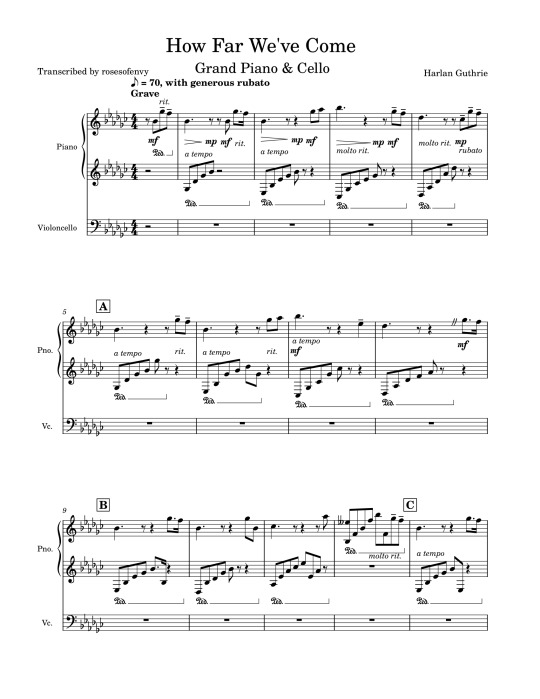
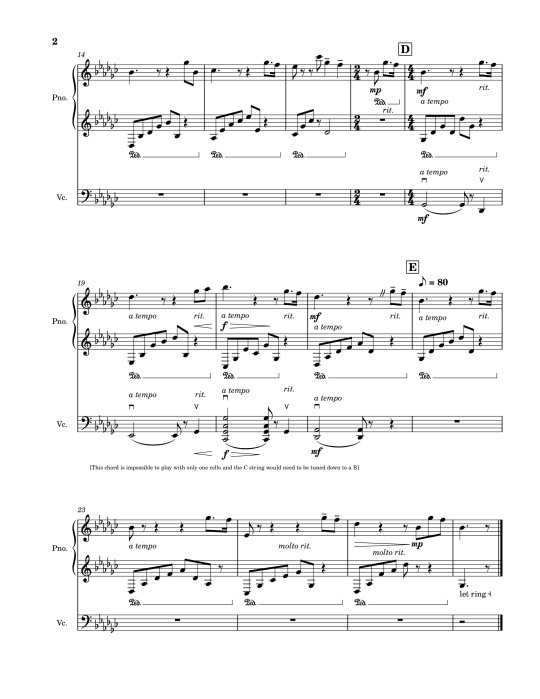
#malevolent#malevolent podcast#malevolent soundtrack#how far we've come#harlan guthrie#arthur lester#john doe#music theory#music theory analysis#piano#cello#I'm working on performing this but I only have access to a piano and cello once a week :'(#and I have so many other projects I've been working on *cries*#i spent a good week transcribing this#then a good two days analyzing it#my music theory chops are rusty#I was seriously pulling out my orchestration and harmony in context textbooks to check my facts#and i'm still worried i made mistakes askljdfhlsa#take all of this with a grain of salt!!!#envy writes
98 notes
·
View notes
Text
Live orchestra session by a therian!
youtube
This orchestra session is premiering on YouTube on Thursday, September 5th at 6:30 PM EST. This is from the live session last week and will be one of three music videos from the performance. This is the first orchestral recording by a therian/otherkin/alterhuman. And it is delightful to watch the players up close. Here's a sneak peek:
Starlight Telepath is coming :3
#therian#therianthropy#therian music#wolf therian#therianthrope#music#otherkin#alterhuman#therians#therian community#otherkin music#alterhuman music#alterhuman community#otherkin community#live orchestra#live music#orchestra#orchestral music#Youtube
76 notes
·
View notes
Text
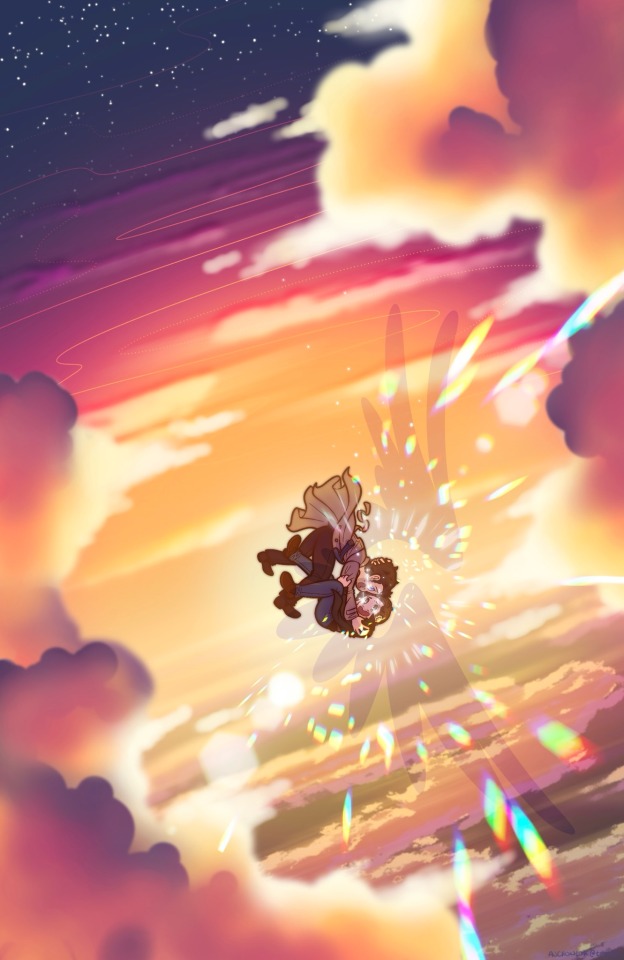

It's so clear now that you are all that I have I have no fear cos you are all that I have
so i decided i wasn't actually all that happy with the background of this piece and redid it haha :'D
again, this is from a post-series Empty rescue plotbunny, it's yet another image of Dean and Cas in freefall (which is probs from watching too much Eureka Seven in hs), and have the soundtrack that is both inspired by this scene and acted as inspiration to draw this (mostly Snow Patrol's You're All I Have and Signal Fire being blasted on repeat):
(also how the FUCK do yall size your procreate shit for tumblr? i feel like everything i post looks like a pic i took with my first slide phone circa 2008... it makes potato quality look good *sobbing*)
#destiel#deancas#Supernatural#Supernatural art#Supernatural fanart#Tay art#Tay digital art#Tay SPN art#by god i will force my obsession with 90's power ballads on you all if it's the last thing i do#(yes i know some of these songs are from the 00's/10's hush the bands are best known for 90's power ballads so it still counts !!!)#woe orchestral string instruments be upon ye's rock music#will i ever write this fic ???#:)))#(unfortunately rn my brain is very much Echoes/Inner Demons soup so that's the main bnuuy that's been eating away at me)#(ah yes. Echoes/Inner Demons. which i have. talked at length about. yes yes we all know about [REDACTED] how could we not?)#(this is comedy i have yet to talk abt it bc it's my baby and concept i have seen. 2. other ppl do.)#(and one of those fics was the spark for Echoes while DtA was the gasoline lol)#Taylor's plotbunnies#Spotify
171 notes
·
View notes
Text
So @sayuri-of-the-valley and I were talking about the music in Good Omens 2 and particularly the similarities and differences in the music that happens 'Before the Beginning' (that's the song title) and at The Kiss (that's not the song title) and I have accidentally developed Theories and had Thoughts, so I’m gonna share them in case anyone else wants to weigh in.
First of all, the general musical structure is similar. They are both dramatic moments that start quietly, grow to a powerful crescendo at the Big Moment, and then resolve more quietly again, but with subtle changes that make them feel very different. Without actually going through and checking it, they sound to be at roughly the same tempo (around 140 BPM) and comparable time signatures.
Now, I'm treating these two dramatic moments and the surrounding music as two songs, although in the soundtrack the music surrounding The Kiss is actually divided into two songs itself: I Forgive You and Don't Bother, so that's. Fine. I'm normal about that. I'm sure dividing that in half doesn't Mean Anything at all. I'm NORMAL about it!!! Ah... anyways.
The instrumentation for both Before the Beginning and The Kiss is also very similar. Both songs start with orchestral winds and strings and add a powerful choral part (on the same pure round vowel sound, no less!) on the big crescendo. Both add orchestral chimes (bells) for that epic religious feel. Both the nebula creation and the kiss were a revelation. Something like a religious experience.
And then both songs resolve featuring wind and strings again, among other instruments. The "after" part of both songs also features more pitched percussion (harp, maybe a celesta, glockenspiel, possibly a dulcimer or some other fun, ethereal pitched percussion in Before the Beginning, but interestingly a piano in Don't Bother). Ouch. That hurts.
Now, to me: the piano is possibly representing the nightingale, Crowley and Aziraphale's love of Earth and humanity, whereas the glockenspiel and etc. may be more representative of heaven. Just a guess. I would have to do more careful listening for a more solid theory.
I don’t have perfect pitch so it’s hard to tell without getting out my instruments or transcribing the piece, but I’m willing to bet ‘I Forgive You’ is in the relative minor key to Before the Beginning’s mostly major key (I *think* ‘Before the Beginning’ might be mostly in the key of C major and ‘I Forgive You’ in A minor, but I could be wrong). Regardless, the former is major and the latter is more minor, but otherwise a lot of the chord structures, especially at the big moment, sound very similar.
More on instrumentation: ‘Before the Beginning’ uses more (ethereal?) flutes in the wind sections and The Kiss uses more reed-based, (earthy?) winds like clarinet, bassoon, oboe, etc. Different feel, but the same kind of structure. Both moments heavily feature a big string section for the nice full orchestral sound.
Before the Beginning has a lot going on musically before the crescendo and it intentionally feels kind of chaotic and unformed bc each instrument family is doing something a little different, building anticipation, etc. and then at the big crescendo, they all come together. Very powerful. Then after the crescendo, we get a subtle, playful reprise/variation of the Good Omens Main Theme. The strings and the winds are no longer entirely together at this point. They’re sort of playing off one another, leaving space. Having a conversation.
By comparison, in ‘I Forgive You’ the wind/strings start off playing together, in a sad version of unison before the crescendo (they both knew the conversation they were having wasn’t going to end well but they fundamentally *understand* one another now; they’ve been talking for millions of years). And AFTER the crescendo of The Kiss, the song ‘Don’t Bother’ DROPS the majority of the string section and gives the melody to a solo violin (alone!!!!). Even worse (better) the strings and the woodwinds and pitched percussion are no longer playing together. This time, they aren’t even having a conversation. They’re musically doing a separate lines. It feels extremely lonely (because it is). The violin is very exposed. The piano is very exposed. Even the chorus sounds exposed (smaller group of singers?). This ALSO includes a reprise/variation on the main GO theme, but instead of being playful it’s extremely sad (as though you didn't notice). The rest of the orchestra is still there, providing background, but it's not the same.
The Biggest Decision (the song after Don't Bother) has a lot more of those ethereally coded instruments again. Harp, pitched percussion. Full string section. Angelic chorus. Aziraphale is making the hardest/worst decision to return to heaven.
And to round it out, once we get to "The End?" we are back to piano. Our duo is separated. Now in place of the solo violin we have solo cello and piano. Gutting. We get notes of the ethereal celesta (I think). The piano keeps us grounded, but cello is a big focus. We also get more of that haunting chorus and violin runs. And then we end with solo piano playing the same 5-note run three times. Alone. After every other instrument has dropped out. Very lonely.
Just for fun, (and to end on a slightly more positive note), I went back and listened to the ox rib music as well, which was surprisingly consistent with some of my theories from up above and also not on the soundtrack so although I'm sure it has a name, I certainly don't know it.
In the ox rib section, there are more instruments before the first big moment (when Aziraphale tries the food) that are going back and forth. Again it sounds to me like they’re having a conversation… tempting and being tempted. Winds and strings (strings are tremoloing like at the kiss for that sweet, sweet tension), but also brass instruments. We have some more ethereal sounding pitched percussion, especially *before* he tries the food but afterwards it... switches to piano! Like I said: Earth!!!
The choir is on a different vowel altogether for this part (more aggressive and ominous, a taller Ah instead of a round Oh/Aw like the first two musical moments). The choir is also much more rhythmic. Again, increasing tension. And, of course, after he tries the food the music supports the tension of the scene by gradually building, getting louder and bigger after the key moment has already passed. It's super interesting that Aziraphale trying the food is actually quite quiet, but the music grows quickly afterwards. Sort of the inverse of how the other two scenes play out musically! Fascinating!!
Anyways, let me know what you think I got wrong and what I missed and if I thought something was a celesta when it was actually a glockenspiel or something. I am thrilled and devastated by this incredible music.
#Good Omens#Good Omens 2#Good Omens Soundtrack#Good Omens music#David Arnold#Neil Gaiman#Good Omens meta#I have so much more I could say#but believe it or not this was the condensed version#also the strings used two types of tremolo which is neat#did I detect some col legno in there as well?#god I love orchestral music#Also I think there was mandolin or some other kind of picked tremolo in Before the Beginning#I love to see it... or hear it I guess
487 notes
·
View notes
Text
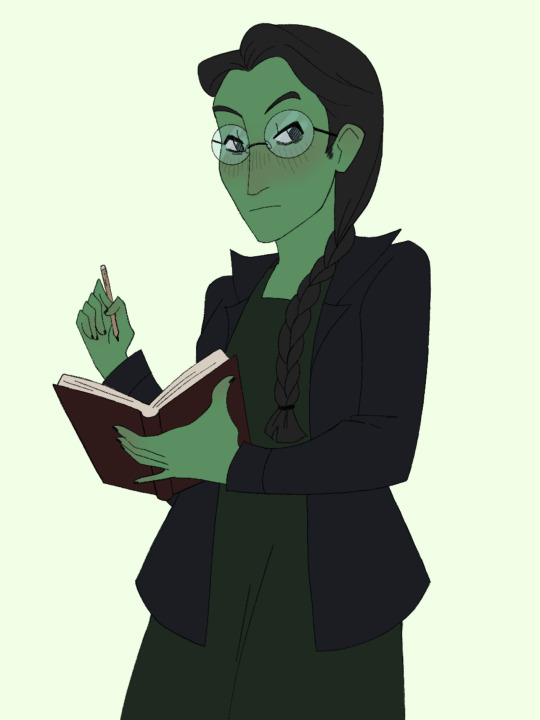
I love it when girls are unusually and exceedingly peculiar and altogether quite impossible to describe
#wicked#wicked the musical#elphaba thropp#I’m rereading the book rn and man I forgot how much I love book elphie#shes so funny#orchestrates a whole meeting for Boq and Galinda just so she can sit to the side and interject with her personal commentary#and annoy them both <3#truly unmatched. love her so much
163 notes
·
View notes
Text


my wenclair duet/orchestral au!
#my art#wenclair#wednesday x enid#wednesday addams#wednesday#enid sinclair#enid#wednesday netflix#orchestral au#they were original soloists and then met#and just kinda#duetted together#and fell in love#and performed more together (as wives)#and they have a rlly cute musical rivalry
2K notes
·
View notes
Text

back to the sunny.png
#one piece#sanji#this scene was sooooooo good by the way#when the orchestral version of We Are starting playing I lost ittttttt#generally speaking I like the manga better than the anime#but when we get scenes like this w/ amazing music and voice acting and colours it's like oh yeah watching the anime is so fucking worth it
62 notes
·
View notes
Text

#Romanticism#Symphony#Chamber Music#Orchestral#Choral#Christian Liturgical Music#Czechia#1880s#1890s#[realizing we don't really have a set procedure for classical composers LOL... hope this is ok 👍]#Spotify
185 notes
·
View notes
Text

#ukraine#music#crimean tatar#qirim#qirimlar#crimean tatar culture#crimean tatar music#classical music#orchestra#orchestral music#symphonic
246 notes
·
View notes
Text
Lads LADS LADS!!!!!!!! Darren korb fucking cooked AGAIN and he gave us a FEAST are you KIDDING ME??????
#OLYMPUS AFFLAME MY BELOVED!!!!!!!!!!!!!#HE GOT A FUCKING AULOS IN THERE BRO WHAT THE FUCK#WRATH OF THE HEAVENS IS SICK AS FUCK!!!!!!!!!#ITS GIVING GOD OF WAR#NAH BECAUSE THE WAY OLYMPUS HAS ORCHESTRAL MUSIC AND THE UNDERWORLD HAS METAL#LIKE OPPOSITES TO EACH OTHER#AUGH#AND FUCKING#MOUNTAIN OF THE GODS HAVING THE ON THE COAST MOTIF#BRO#BROOO#I MISS PERSEPHONE 😭#IM FREAKING THE FUCK OUT RN SOMEONE SAVE ME#hades 2#hades ii#darren korb#supergiant games
43 notes
·
View notes
Text
MORE THAN ANYTHING - REPRISE ↳ from Hazbin Hotel Season One (2024): 1x08 - "The Show Must Go On"
#hazbin hotel#charlie morningstar#vaggie#hazbin vaggie#chaggie#hazbin charlie#KILL ME KILL ME NOW ACTUALLY LOOK AT THE WAY THEY LOOK AT EACH OTHERRRRRRRRRRRR#AAAAAAAAAAAAAAAAAAAAAAAAA#the fact that they integrated the familial love song into a romantic love song makes me think.... makes me THINK THAT THIS TUNE#can be the ''Main'' Theme for the rest of the show. PLEASE tell me im guessing right i will literally die it can apply to SO MANY SITUATION#more family love. more romantic love. more platonic love. more of ANYTHING ELSE. scenes with any flavor of affection and connection.#IT CAN BECOME THE THEME OF THE CONNECTION FOUND BY THESE WAYWARD SOULS AND THE UNIQUE BOND THEY'VE COME TO FORM#*slams hands on table* THEY CAN ALSO BE EVIL AND USE A SLOWED DOWN VERSION AS A SAD SONG!!!!!!!!! WHEN A CONNECTION IS BROKEN!#WHEN A FRIENDSHIP IS LOST OR CALLED INTO JEOPARDY! WHEN A TIE BETWEEN CHARACTERS IS SEVERED#BY EITHER CHOICE OR TRAGEDY.#THEY CAN PLAY A DRAMATIC ORCHESTRAL VERSION WHEN SOMEONE STEPS IN DRAMATICALLY TO SAVE THEIR FRIENDS. AAAAAAAHHHH!!!#FUCK ME UP!!!!!! JUST FUCK ME UP!!!!#my videos#music vids: s1#song: more than anything (reprise)
144 notes
·
View notes
Text
im back on my bullshit, guys
NEW ✨ORIGINAL✨ SONG (tw for blood and 1 not loud gunshot near the start, please skip to 0:20 if that's an issue!)
youtube
inspired by the lovely resin psychopath himself
this was also a gift to someone dear to me :] i am genuinely SO ecstatic with how this and the art turned out!!!
and also here's the art

#youtube#original song#original music#law of talos#castle of nations#endzone#karl#ultrabox#beepbox#synth music#y'all it's so hard to make orchestral sounding music with a chiptune maker lmao#i have a professional music program i just cant get myself to learn how to use it#ultrabox is literally so easy for me to use but it's very limited#yes the darude sandstorm bit with the trumpets is a nod to that silly live action video
56 notes
·
View notes
Text
guy very into musical theatre who mistakingly thinks they're connecting with me over a shared interest: yeah, weber is foundational and all, but i've always felt more of a connection with what starkid's got going on, y'know?
me, who's only ever listened to tracks from the musical episode of Psych: uhhhhhhhhh... hello my name is shawn spencer? this is my partner, lil' wayne? the evidence is underwhelming? but my intuition is insane?
#to be clear i am in fact a muscian and have a greater-than-basic understanding of the genre and the artform#in fact half the reason i'm so obsessed with the psych musical is bc of all the ways it utilizes the actual genre tropes of musicals#to make itself an effective and genuine article of the medium#but outside of the theory uhhhhhhhhhhhhhhhhhhhhh sorry i know nothing i am but a wee babe#honestly the orchestration of the tracks is what i keep finding myself impressed by#it's so varied and diverse both in harmonic structure/progression and actual instrumentation#one thing i especially love is how the piece where shawn spells out the crime combines a ton of motifs from earlier tracks#into one unified piece of music#which directly mirrors how these breakdowns narratively combine all the facts the audience has been shown throughout the episode#psych#psych the musical#running my mouth
42 notes
·
View notes